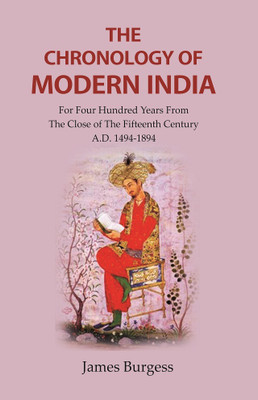The Chronology of Modern India : For Four Hundred Years From The Close Of The Fifteenth Century A.D. 1494-1894(Paperback, James Burgess)
Quick Overview
Product Price Comparison
About The Book : About eight years ago materials for the volume were collected from the historical works of Orme, Briggs's Ferishta, Elliot and Dowson, Mill and Wilson, Grant-Duff, Elphinstone, Marshman, Malleson, Kaye, Holmes, Danvers, Phayre, Trotter, and othersŌĆötoo numerous to mention. These were arranged in 1907, but laid aside. In now revising it for the press, much of it has been rewritten and considerably extended. By writers of the eighteenth and most part of last century, Indian personal and place names were written in every variety of spellingŌĆöoften in forms now scarcely recognisable. To avoid the confusion of such irregularities, proper names are here represented in general accordance with the system in use in the recent Gazetteers and Maps of the Indian Government and in several recent historical works. Differences in the dates of events are not infrequent, occurring chie’¼éy in translations of Muhammadan histories,ŌĆöarising partly perhaps from inattention in computing the European from the Hijra reckoningŌĆöbut also from other sources,ŌĆöand it is difficult to rectify such differences when they amount to a year or more. When careful research is applied to such matters, cases of the kind will in course of time be cleared up; and though none of them are of great importance, they may be corrected when a second edition of this handbook is required. About The Author : James Burgess CIE FRSE FRGS MRAS LLD (1832 ŌĆō1916), was the founder of The Indian Antiquary in 1872 and an important archaeologist of India in the 19th century. Burgess was born on 14 August 1832 in Kirkmahoe, Dumfriesshire. He was educated at Dumfries and then the University of Glasgow and the University of Edinburgh. He did educational work in Calcutta, 1856 and Bombay, 1861, and was Secretary of the Bombay Geographical Society 1868-73. He was Head of the Archaeological Survey, Western India, 1873, and of South India, 1881. From 1886-89 he was Director General, Archaeological Survey of India. In 1881 the University of Edinburgh awarded him an honorary Doctor of Letters (LLD). He retired to Edinburgh around 1892. He was elected a Fellow of the Royal Society of Edinburgh in 1894. He won its Keith Medal for 1897-99, and served as their Vice President 1908 to 1914. He died on 3 October 1916, at 22 Seton Place in Edinburgh.


